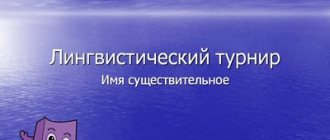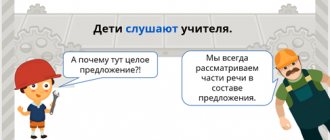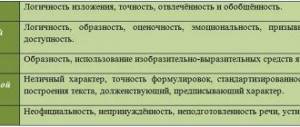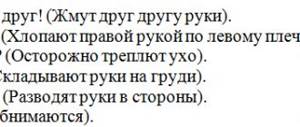A child who cannot read well faces serious problems while completing various tasks in other subjects. In elementary school, reading aloud speed is checked periodically. In second grade, reading technique must be tested at least twice a year.
Second graders are tested:
- how developed is the ability to read whole words and phrases;
- whether the student understands the meaning of the content of the text;
- whether the child knows how to use pauses that correspond to punctuation marks in the text;
- Are intonations used when reading that convey the characteristics of the characters?
Assessment of reading technique in second grade according to the Federal State Educational Standard
| Grade | 1st half of the year | 2nd half |
| «5» | More than 55 words | More than 70 words |
| «4» | 40-55 words | 55-70 words |
| «3» | 25-39 words | 40-54 words |
| «2» | Less than 25 words | Less than 40 words |
Texts for testing reading technique in the second grade should be selected depending on the recommendations of the methodologists. Sentences in the text should consist of words familiar to the child. You should not take texts that contain long adjectives, rarely used words, dialogues or pictures.
The child’s development process largely depends on reading speed. Many students are doomed to failure simply because they have not learned the most basic thing - reading. Therefore, it is difficult to overestimate the importance of reading in the life of a schoolchild.
Check in the first half of the year
Text No. 1 Marten
A small predatory animal lives in a dense forest - a marten. The marten is smaller than a cat. She is very agile and climbs trees so well that even an agile squirrel cannot always escape from her. The marten hunts for mice and other small animals. And when summer comes, the berries will ripen in the forest - the marten will feast on them.
(51 words. V. Chaplin)
Text No. 2 Summer
White lilies and golden water lilies opened on the river. Water porridge blooms wildly over the water.
A wild duck hatched little ducklings from the sedge. White and blue dragonflies fly over the water. Pot-bellied crucian carp swim in the water. In the green sedge the toothy little bee was quiet and hiding. Water spiders scurry across the pond on long legs.
It’s good to run around the meadow and lie in the grass under the birch trees.
(59 words. I. Sokolov-Mikitov)
Text No. 3 Might is not right
Misha ran into the garden, snatched the doll from his little sister Tanya and galloped around the garden with the doll on a stick. Tanya stood and cried.
Elder brother Seryozha ran out of the house. Seryozha thought it was fun to carry the doll around the garden, and he took the doll and the horse away from Misha.
Misha ran to complain to his father; and my father sat by the window and saw everything.
(57 words. K. Ushinsky)
Text No. 4. Lion, bear and fox (reviewed in October)
The lion and the bear got meat and began to fight for it. The bear did not want to give in, and the lion did not give in. They fought for so long that they both became weak and lay down. The fox saw their meat, picked it up and ran away.
(35 words. L. Tolstoy)
Text No. 5. Badgers (tested in October)
The sun was shining brightly. There was a badger hole under the pine tree by the river. A badger was sitting at the hole. The animal made a faint sound. Badgers began to crawl out of the dark hole. The kids were small and fat. The little badgers began to play. They rolled from side to side on the damp ground. The little badger was the most cheerful.
(47 words. I. Aksenov)
Text No. 6. Golden Snowdrop (tested in December)
After a cold, harsh winter, everyone is looking forward to spring. Who opens spring?
The spring of flowers is opened by the early firstborn - the coltsfoot. This golden snowdrop grows on sunny clay slopes. Coltsfoot blooms before all the grasses - before the exhibition of hives, before the flight of the first bees, before the ice breaks up.
This wonderful flower blooms for about two months.
(51 words. K. Pronin)
Text No. 7
In ancient times, there lived a girl. One day she took a handful of ash and threw it into the sky. The ash scattered there, and a starry road ran across the sky.
Since then, this star road has illuminated the Earth at night with a soft light, so that people return home not in complete darkness and find their home.
(47 words)
Text No. 8. Wonderful Christmas tree (checked in December)
The guys organized a festival for birds and animals in the forest. On New Year's Eve they decorated the tree with berries. The children tied pieces of bread to the upper branches. Carrots were attached to the lower branches. A head of cabbage was stuck under the tree in the snow. In the morning, flocks of elegant birds arrived. They chirped joyfully and treated themselves to gifts. In the evening, under the tree near a head of cabbage, two birds with one stone are busy. They feasted on delicious cabbage and sweet carrots.
(61 words. G. Skrebitsky, V. Chaplina)
A system of tasks for understanding text according to the method of O.N. Zaitseva. - presentation
System of tasks for understanding the text according to the method of O.N. Zaitseva
Reading literacy is a person’s ability to comprehend written texts and reflect on them, to use their content to achieve their own goals, develop knowledge and capabilities, and for active participation in the life of society. //Kovalyova G.S., Krasnovsky E.A. A new perspective on literacy. According to the results of the international study PISA.
Olga Nikolaevna Zaitseva Biography: born in Moscow, in 1963, graduated from secondary school No. 680 in Moscow, in 1986, Moscow State Pedagogical Institute. Lenin, Faculty of Philology. Main place of work: teacher at State Budgetary Educational Institution Secondary School No. 1058 in Moscow, Honored Teacher of the Russian Federation, Candidate of Pedagogical Sciences, Associate Professor, laureate of the Scientific-Professional Educational Institution “Education” in 2006 and 2012. LIST of published and equivalent scientific and educational works of Olga Nikolaevna Zaitseva SCIENTIFIC WORKS History of language as a structural and content component of the school course (Theses). //Language of education and language education. Historical approach to studying the Russian language at school // Modern paradigm and school textbooks on the Russian language. Materials of the All-Russian Scientific and Practical Conference November 2-3, 2000 - Orenburg, 2000 Literary education grades 5-6. Methodological manual for teachers. // M., Bustard, 1996,1998,2001,2005. A system of lessons on working with V.I. Surikov’s painting “Suvorov’s Crossing of the Alps” in the course of the academic subject “Russian language”. Learning to write an essay based on a picture.// Education in a modern school C and others
Structure of a workbook on the Russian language. Text comprehension tasks. for grades 5-8 Section I: Learning to read educational texts. Section II: Learning to read and solve educational texts. Section III: Learning to read and understand educational texts. Section IV: Mastering types of reading (introduced from 7th grade).
The text material in the manual is arranged in accordance with the main objectives of teaching and monitoring skills related to information processing of text. Each text (1 competency task) is aimed at developing skills, mastery of which indicates a complete understanding of the text: - general orientation in the content of the text and understanding of its holistic meaning; — finding educational information in the text; — interpretation of the text (problem, topic, author’s position); - reflection on the content of the text or on the form of the text and its evaluation (student’s opinion, arguments)
System of tasks for the section “Learning to read educational texts” Tasks that form the ability to correctly determine the topic of the text: 1. You read a text that basically says that: 1) the Russian language is sonorous and melodic 2) the Russian language has a large vocabulary 3) the Russian language is one of the most developed and rich languages in the world 4) the Russian language is alive like life (the most common wording of a task for a text to determine a topic)
2. Indicate the line whose words and combinations of words most closely correspond to the main theme of the text: 1) fascinating linguistic legends, native language; 2) read, write, sing, think, dream; 3) the mystery of language, the mystery of the origin of language; 4) the priceless gift of God, the human ability to speak;
3. HOW CAN YOU NAME A TEXT, CONSIDERING ITS MAIN TOPIC? 1) M.V. Lomonosov 2) Founder of Moscow University 3) Scientific discoveries of Lomonosov 4) Native language 4. Indicate the main topic of the text 1) The mystery of language 2) Language is a means of communication 3) Language is an invaluable gift of God 4) The secrets of linguistics
5. Find the correct judgment about the title of the text 1) the title of the text contains the main idea of the text 2) the title of the text contains the topic of the text and an indication of the type of speech 3) the title of the text contains an indication of the scientific and journalistic style of speech 4) the title of the text contains an indication of the author's attitude to the wind
!!! Such tasks teach students to constantly ask themselves the question: what or who is this text about? They learn to work with keywords that carry the main thematic information of the text, to connect the topic of the text with its title, to fully assimilate the information of the text, and to correlate the information of tasks.
Tasks that form the ability to correctly determine the main task (main idea) of the text: 1. Suggest for what purpose the author wrote this text: 1) talk about the properties of the language 2) talk about how beautiful the Russian language is 3) convince the reader of how The Russian language is beautiful 4) think about the secret riddle of the language (the most common wording of the task)
2. Which statement corresponds to the author’s position 1) The author believes that “language makes a person a person”... 2) The author believes that “language is a priceless gift of God.” 3) The author believes that “the ability to speak came to man on its own” 4) The author believes that “language appeared as a result of the long, centuries-long transformation of animals into humans” (The task teaches how to work with text quotations)
3. Read the text “Letter to the Youth of the 21st Century”. Formulate the main idea of this text using a quote from I.S. Turgenev’s text “Language and Literature” (The task is aimed at developing the ability to formulate the main idea using someone else’s text (comparing the text, highlighting the main )
4. Read the texts and complete the tasks Vertushinka River Vertushinka There is more than one aspen tree above you Ah, the Vertushinka River - Intoxicated is bent over. Steep banks, With your witchcraft, Pinwheel, Along the creeks - a water lily, The whole soul is full to the brim. And in the meadows there are haystacks. … … (A. Yashin) (P. Kupriyanovsky) “Vertushinka” The small river Vertushinka is very similar to a large full-flowing river. It has its own shallows and backwaters, fast rocky rifts. In spring it spreads widely. Then a large fish comes into Vertushinka from a large, high-water river to spawn. In early spring, pikes are found here, and slippery burbots hide under the overhanging banks and under the roots of bushes and trees. ... (I.V. Sokolov - Mikitov)
Tasks for three texts 1. Find a statement that indicates a characteristic of Vertushinka that is not found in any of the three texts about it: 1) Vertushinka is a wide, high-water river at any time of the year 2) Aspen trees grow along the banks of Vertushinka 3) Vertushinka has its own shallows and backwaters, fast rocky rifts 4) In the deep recesses of Vertushinka white lilies and yellow water lilies float 2. Give evidence that Vertushinka has steep banks? Use citations.
3. Provide evidence that Vertushinka is a fast river. 4. Write out fragments from the texts that show the author’s attitude towards Vertushinka 5. Fill out the table “Vertushinka River” (flora and fauna) Plants (including along the shore) Fish Insects
4. The teacher suggested that you learn the most important thing in the paragraph as homework. What will you teach? 1) memorize the examples and memorize the poem 2) learn the rule enclosed in the frame, memorize some examples that confirm the rule 3) you will learn the paragraph by heart 4) at home, learn to retell the entire paragraph in your own words
5. Which statement of M.V. Lomonosov does the author of the text consider correct? Write out a fragment of text. 6. How can you name the text, taking into account the author’s position of the text (the main idea of the text)? 7. Based on the text, continue the phrase, highlighting only the main information of the text. !!!Such tasks are aimed at teaching the student to ask himself questions when reading a text: for what purpose was the text written? What did the author want to convey to the reader? They learn to highlight important information in the text and understand the purpose of speech.
Tasks that develop the ability to correctly understand the structure of a text, identify cause-and-effect relationships, and translate information from one type to another: 1. Which text fragments are the most important from the point of view of conveying the basic information of the text? 1) fragments that contain information about the main topic, the main idea of the text, the author’s position is expressed 2) fragments that provide additional arguments for the author’s point of view 3) fragments in which the author emotionally defends his point of view 4) fragments that describe difficulties in solving the problem
2. State the rule of paragraph 147 in the form of a table (pay attention to the numbering in the table!) Name the table paragraph. Formulation of the rule Examples (1)
3. Translate the information given in the algorithm into coherent scientific style text. Write the resulting text in words. Algorithm 1. IS THE PARTICIPLE USED WITHOUT NOT? NO YES CONTINUOUS 2. Full participle or short? Brief complete separately 3. Are there dependent words or opposition in the participle yes no separately together
4. Arrange the points of the plan in accordance with the content of the text. Write down the answer as a sequence of numbers. Plan. 1. Old russula. 2. The road through the spruce forest. 3. The cup is drunk. 4. Autumn day. 5. Forest clearing. 6. Introductory part (The task teaches you to search for the necessary information in the text, highlighting its main structural and content parts)
5. Read a fragment of the text about red russula. Is it possible to insert the given description of russula into M. Prishvin’s text? Justify your answer. Fragment of the text by M. Prishvin: “Next to the stump in the green lingonberry there is a red russula. So huge, the likes of which I have never seen in my life. It is so old that its edges are curled up. And because of this, the whole russula was exactly like a large deep plate filled with water...” Fragment of the text: “Red russula grows in deciduous and coniferous forests. Fruiting bodies form in July-October. The cap is 2-8 cm in diameter, thinly fleshy, hemispherical, then spread out, depressed in the center, bare, sticky...” (The task is aimed at testing the systematic understanding of the text, the ability to see the thematic and semantic unity of the text)
6. Read exercise 162 paragraph 17. What tasks do the authors of the textbook suggest you do? Write down the sequence of tasks. Indicate the suffixes of adjectives. Write down these suffixes. How many letters n are written in these suffixes? goose earthen chicken clay horse sandy 2. What is the meaning of the suffix in the words of the first column? In the words of the second column? Which of the two suffixes is always stressed?
3. Considering the meaning of suffixes, give three examples of words each with the suffixes -IN- and -AN- (-YAN-). I. In the suffix -in- one letter N is always written: a sparrow feather (belongs to a sparrow). In the suffix -AN- (-YAN-) one letter N is also written: silver spoon (spoon made of silver), ice ball (ball made of ice) Exception: tin, glass, wood 7. What types of speech are used by the author in this text? Indicate the sentence numbers and determine the type of speech!!! Such tasks teach how to work with text quotations, develop the ability to formulate the main idea using someone else’s text (comparing the text, highlighting the main thing), and are aimed at teaching the student, when reading a text, to ask himself questions: for what purpose was the text written? What did the author want to convey to the reader? They learn to highlight important information in a text, search for necessary information in a text, highlighting its main structural and content parts, and develop the ability to build a typological basis for a text.
Tasks to develop the ability to select the right arguments 1. Copy from the text the examples that the author gives to explain his thoughts to the reader. Write out examples in the form of sentences you formulated. 2. Write down from the text the evidence for the need for wind in nature, which is used by L.N. Tolstoy. 3. Fill in the table with statements from L.N. Tolstoy. “The purpose of the wind in human life” The purpose of the wind Examples from the text of L.N. Tolstoy 1. Obtaining electricity 2The emergence of ocean currents
4. Do you think that today “Moscow is the head of all cities”? Provide at least two pieces of evidence for the thesis you put forward (For example: I agree that even today “Moscow is the head of all cities” because... - or: I don’t think that even today “Moscow is the head of all cities” because...) 5. Would you go on an excursion to Uglich? Provide at least two pieces of evidence for your thesis. 6. Which of the text’s statements is supported by evidence? 1) It is necessary to take care of the Russian language 2) The language must be treated respectfully, as if it were a powerful weapon... 3) The Russian language is beautiful 4) The language is a treasure, it is an asset passed on to us by our predecessors.
Argument 1 The Russian language can be compared to the value of water. Living in a region with a large number of lakes and rivers, it seems that water is not a value at all - because there is so much of it. Residents of arid and desert places have a completely different attitude towards water, where any source of water is a source of life... Argument 2 On its historical path, every language encounters dangers. Our language also has to fight them. And now I want to talk to you about one of them. Under the arch of the gate of my house at one time there hung such a poster - an announcement: CITIZENS! PLEASE TAKE THE SCRAP TO THE WIPERER THAT HAS ACCUMULATED! I don't know if you've ever seen the "windshield wiper build up"
7. M.M. Prishvin wrote: “The forest reveals itself only to those who know how to be attentive to its creatures.” Do you agree with the writer? Explain your point of view based on the text. 8. Why didn’t the Nazis deal with the prisoners? Support your answer with words from the text (quote!). !!! Such tasks are aimed at understanding the general content of the text, the ability to argue the thesis put forward, and highlight evidence in the text.
System of tasks for the section “Learning to read and understand texts” Tasks that form the ability to understand a text at a content level, search for information in the text, work with details, establish cause-and-effect relationships: 1. If you want to learn more about the historical past of Nizhny Novgorod, reflected in folklore, what book should you borrow from the library? 1) Encyclopedic Dictionary 2) Brief reference book - a guide to Russian cities 3) “Poetry of the Novgorod region” 4) Nizhny Novgorod traditions and legends / Comp. V.N. Morokhin - Gorky: Volgo-Vyatka book. Publishing house
2. How did the teacher react to the children’s message about the incredible event? The task is aimed at developing the ability to search for information in the text, isolate it in the text, establish cause-and-effect relationships (teacher’s reaction - wide open eyes - the reason that caused such a reaction - surprise) Sample answer: “The teacher was very surprised” and confirmation with the quote “Widely open eyes of the teacher"
3. In the text, the author talks about the behavior of the baby and the mother. Using the text, fill out this table Baby Mother The task is aimed at developing the ability to search for information given explicitly in the text, isolate it in the text, convert information from one type to another Baby Mother The baby is lying in the crib and is breathing quietly, evenly The tired mother is not sleeping . She quickly opens her eyes and looks restlessly and tenderly at her dear face. The baby woke up and began to cry. The mother is still awake and sensitively listens to the child’s even breathing.
4. Divide the sentence into the main statement and corollaries: “Solar systems” similar to ours abound in every galaxy (according to scientific data, there are more than 125 billion galaxies in the Universe) and the likelihood that there are planets similar to Earth is very is great, which means there is a high probability of the existence of intelligent life. Statement: Consequence: The task is aimed at developing the ability to establish cause-and-effect relationships Answer: Statement: “Solar systems” similar to ours are found in large numbers in every galaxy (according to scientific data, there are more than 125 billion galaxies in the Universe) Consequence: probability, that there are planets similar to Earth is very high. Consequence: the probability of the existence of intelligent life is high.
5. Read the synonyms for the word awe. Write down those synonyms that, from your point of view, can explain the condition of the wounded. Synonyms: excitement, agitation, trembling, fear, confusion, vibration, passion, trembling, hesitation, vibration, confusion, shudder, excitement, fear, fright, horror, shudder, horror The task is aimed at understanding the text (understanding the state of the hero) Answer: they can words to be written out: excitement and excitement
6. A number of key words were extracted from one text: Sad, devoted, hungry, shaggy, furiously, hateful, cold, tousled, dirty, blowing through, long, pathetic, nothing, don’t be sad, perplexed, small, constantly at work, it is necessary, around the corner, leaving a living being, with hopes and experiences, forgive me, I can’t, don’t look, and in general... The situation, realized the value, help to “see”, “hear”, meetings, friends, devotion, love, the thirst to give, to be necessary, in the blood, service, life, purpose, meaning, search for a master, friend, necessity, with gratitude, beneficial, important, to be a friend, help, find, live, in life, by human law, Code of Honor. Task 1: Based on these words, determine the topic of the text. Task 2: Based on these words, determine how many microthemes are in the text. Task 3: Based on these words, guess what style of speech is used by the author of the text. Task 4: Based on these words, formulate the author’s position
The task is aimed at the ability to read the key words of the text, on their basis to predict the main thematic content of the text, to predict the stylistic dominant of the text, to predict the author’s attitude towards what is depicted. Answer: 1. The topic is man and abandoned animals, human cruelty. 2. Two micro-themes, because first there are emotionally charged words telling about a poor animal and about a person who left a living creature. And the second half of the words expresses the author’s position: it talks about the need for animals in our country, that we need animals just as much as they need us.
Tasks aimed at reflecting on the content of the text, on one’s own activities, and justifying one’s own position. 1. The hero of the book “Deniska’s Stories” is a fictional character, is it possible to say that such guys really exist? Explain your point of view. 2. You read a review of R. Bradbury’s book “Dandelion Wine.” Would you like to read it? Briefly justify your answer. 3. Mom refused to make gooseberry jam. Using the text, try to convince your mother. 4. Will you ask your mother (grandmother) to make you gooseberry jam? Give at least two reasons for a positive or negative answer.
Such tasks are aimed at testing the ability to substantiate the expressed judgment, construct an independent statement-reasoning, independently select and present arguments to substantiate one’s position
Test Task 21. “Belokurikha” Belokurikha leaves no one indifferent! Anyone who has ever visited this resort, admired the mountains in the deep haze, drank icy light water like crystal, water from springs, walked through the forest, which pacifies any heart with its soft gentle embrace, will forever fall in love with this pleasant and affectionate corner of Russia! ...
Task 1 (to determine the topic) You read a text that mainly talks about how 1) the Altaians gave the name to the mountain and the river 2) the places where the Belokurikha resort is located are beautiful and poetic 3) the Russians explain the name Belokurikha 4) the Belokurikha resort was formed Task 2 (to determine the main task of the text) The author wrote this text to 1) show the ambiguity of the name of the resort 2) explain why the Altaians called the settlement Bele-Kur 3) talk about why he fell in love with this pleasant and gentle corner of Russia 4) tried explain the name of the river and village
Task 3 (to test the ability to find information given explicitly in the text) After reading the text, you learned that 1) in the book by A.I. Shaposhnikov “Belokurikha Healing Springs” the Altai name of the village is explained 2) the places where the resort is now located were native to the Scythian tribes 3) all places in Belokurikha have Russian names 4) Bele-Kur in translation from the Altai language means “rowan bridge” Task 4 (to test the ability to find information given in the text in an implicit form) From the text it is clear that 1 )Belokurikha is a resort where springs are used for treatment 2)Belokurikha is the name of the mountain 3)Belokurikha is a popular resort 4) There are many bridges in Belokurikha
Task 5 (to test the ability to formulate simple conclusions based on the text) After reading the text, you realized that “The most fragile thing created by man is a beautiful, poetic word,” because 1) words are forgotten over time 2) the word stores information about the history of any place 3) the poetry of the word is not accessible to every person 4) a beautiful, poetic word is a great rarity Task 6 (to test the ability to determine the approximate content of an unfamiliar book by title, type of reference publication) If you want to learn more about the history of the Belokurikha resort, then which book should you should I get it from the library? 1) “Truth and fiction of the land of Bele-Kur” 2) “History and legends of the Russian land” 3) “The Tale of Bygone Years” 4) “The Tale of the Siberian Land”
Task 7 (to test the ability to draw up a simple plan, to see the relationship between parts of the text) To retell the text in a lesson concisely, you need to draw up a plan in which only points of basic information will be highlighted. To do this, indicate only those letters that indicate the most important information A. A pleasant and affectionate corner of Russia. B. Nature has given healing springs C. The land of Belokurikha remembers many human communities D. The “diamond” of Belokurikha has a beautiful, mythological facet E. The version about white “smoking” vapors over warm springs E. The Altaians named the mountain and the river in the valley of which they lived, Bele-Cours J. Russification of the name
Task 8 (TO TEST THE ABILITY TO CONVERT INFORMATION FROM ONE TYPE TO ANOTHER) Fill out the table “Where did the name Belokurikha come from?” Explanations 1st version 2nd version Task 9 (to test the ability to simply substantiate the stated judgment, to test the ability to find examples in the text that prove the given statement) We believe that the author of the text really likes Belokurikha. Do you agree with us? Justify your answer using information from the text you read. Task 10 (to test the ability to construct an independent statement - reasoning) Based on your knowledge of linguistics, confirm or refute the statement of the author of the text “... they added a purely Russian suffix...” What suffix are we talking about and can it be called “purely Russian”




